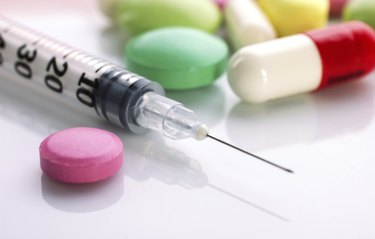
In the past, only people deficient in B-12 or B-6 received injections. Today, the increase in knowledge of the health benefits associated with these vitamins has led many to add them to their wellness programs. Touted as energy boosters, mood enhancers, stress relief and weight loss facilitators, B vitamin injections have become quite the health fad. The question remains as to whether these injections are truly necessary and if there are potential side effects with large doses.
B-6 and B-12 are Essential for Good Health
Video of the Day
Both B-6 and B-12 are water-soluble vitamins essential for good health. They are involved in fat and protein metabolism as well as the conversion of carbohydrates into simple sugars used by the body for energy. The Office of Dietary Supplements reports that B-6, or pyridoxine, is utilized by more than 100 enzymes required in protein metabolism. It also is involved in the production of neurotransmitters. B-12, or cobalamin, is used in the formation of red blood cells, the production of DNA and proper nerve function. According to the University of Maryland Medical Center, vitamins B-6 and B-12, in conjunction with B-9, help control the levels of homocysteine in the blood. MayoClinic.com reports that high levels of homocysteine are linked with cardiovascular disease. The exact relationship between these vitamins and homocysteine levels still is under investigation. Vitamin B12 also has been promoted as a way to facilitate weight loss, but little to no data support this claim.
Video of the Day
Injections for Deficiencies
The recommended daily allowance for adults is a minimum of 1.3 micrograms and 2.4 micrograms for B-6 and B-12, respectively. A B-6 deficiency typically occurs as a result of a poor quality diet, whereas a B-12 deficiency can occur in people who lack the ability to properly absorb it. The elderly also are at risk for low levels of both vitamins due to a limited diet and poor absorption. People with deficiencies in these vitamins require supplementation, whether orally or by injection. Injections are the choice method of supplementation when absorption is compromised. Dr. Robert Oh reports in a March 2003 study in "American Family Physician" that injection doses can vary but generally are given in initial megadoses, such as 1,000 to 2,000 micrograms daily for a couple of weeks, and then levels maintained with injections every one to three months. Those at risk for deficiency might want to consider injections if taking a daily vitamin will be difficult to adhere to.
Where the Injections of Given
These shots are administered by intramuscular injection. They can be given in three locations: the deltoid muscle, the upper hip and the thigh.
Precautions
Vitamin B-12 is considered safe and nontoxic, even at very high doses, but it can interfere with medication absorption. Too much B6 can cause arm and leg nerve damage, but can be reversed by stopping supplementation. Therefore, B vitamin injections should be considered only under the supervision of a health practitioner. Additionally, the University of Maryland Medical Center advises that taking a single B vitamin for an extended period can cause an imbalance of the other B vitamins. It recommends taking a B complex vitamin that contains all the B vitamins in conjunction with injections of B-6 or B-12 to avoid an imbalance. Speak to your health care provider about this concern.